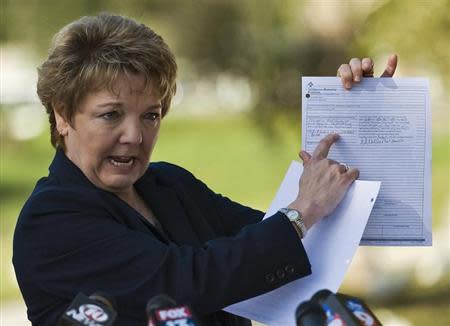Accuser's lawyer criticizes rape probe involving Heisman favorite
By Barbara Liston ORLANDO, Florida (Reuters) - The lawyer for a young woman who claimed to have been raped by Florida State University quarterback and Heisman Trophy candidate Jameis Winston blasted police and prosecutors' handling of the case on Friday and called for further investigation. State Attorney Willie Meggs announced on December 5 he would not file charges against Winston, the front runner to win college football's top award, after accusations surfaced that Winston assaulted a woman in December 2012 before his college playing career began. Meggs said there was insufficient evidence to charge Winston, whose lawyer has said the football player and his 19-year-old accuser had consensual sex. Patricia Carroll, a lawyer for the young woman, told reporters she believed authorities mishandled the investigation. Carroll said prosecutors deleted part of the accuser's medical records showing her injuries, did not question important witnesses who described the accuser as "hysterical" after the incident and delayed testing blood and urine samples. "We perceive that as a problem that warrants further investigation," said Carroll, a former prosecutor. Meggs did not immediately respond to a request for comment. Winston was accused by a Florida State student who said she was raped after a night of drinking with friends at a bar near campus. His DNA was found in the woman's underwear. She did not identify Winston as her assailant until weeks later. Police initially marked the case "inactive" but resumed the investigation last month after news reports identified the football star as a suspect. Carroll said the medical records released by prosecutors to the media and to her did not contain clinical notes describing the accuser as suffering from muscle strain to the lumbar region and lower extremities for which she was prescribed pain killers and a follow-up appointment. In addition to the delays in testing blood and urine, she said investigators failed to test the woman's blood for signs of the so-called date rape drug even though she was showing symptoms including memory loss and immobility. Although a urine sample tested negative for rape drugs, Carroll said the handling of the sample raised concerns about the results. "We had 37 days that elapsed from the time this evidence was taken to the time (the lead investigator) sent it to the lab, which makes one wonder what the hold-up was," Carroll said. She said she was "concerned as the validity of that evidence" and added "anybody can urinate in a cup." (Editing by Kevin Gray and Leslie Adler)



